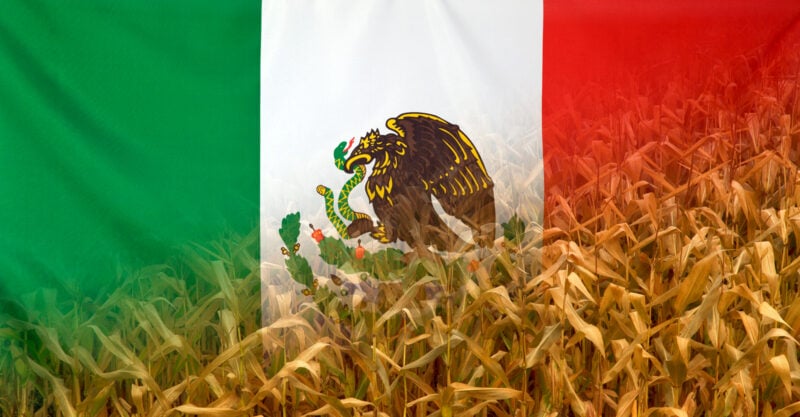Miss a day, miss a lot. Subscribe to The Defender's Top News of the Day. It's free.
Amid a high-stakes standoff with U.S. trade officials over favored American agricultural products, Mexico is slashing the amount of glyphosate allowed to be imported into the country by 50% for 2023.
The move is no surprise — Mexico issued a decree in 2020 giving its farmers until 2024 to stop using the weed-killing chemical. But coming amid an increasingly heated dispute with U.S. trade officials, the action underscores Mexico’s commitment to free itself from a dependence on the synthetic pesticides and genetically engineered crops promoted by American interests.
Along with banning glyphosate, Mexico is ratcheting back imports of genetically engineered corn that is designed to be sprayed with glyphosate. Mexico says the changes are needed to protect the health of its population.
The country has also signaled concerns about other genetically modified (GMO) crops sprayed with glyphosate.
Glyphosate is classified as a probable human carcinogen by the World Health Organization’s International Agency for Research on Cancer and is linked to an array of other human and environmental health problems.
It was introduced by Monsanto in 1974 and is the world’s most widely used weedkiller, known best as the active ingredient in the Roundup brand.
Monsanto developed genetically engineered corn, soybeans, canola and other crops to tolerate being sprayed with glyphosate, a trait that makes it easier for farmers to kill weeds in their fields.
Foods made with crops sprayed with glyphosate commonly carry residues of the weedkiller, and people then consume the residues through their daily diets.
Mexico’s retreat from these types of agricultural products has triggered a firestorm of industry opposition in the U.S.
In response, the Office of the U.S. Trade Representative (USTR) and other U.S. agencies are fighting Mexico’s efforts, alleging violations of trade provisions of the U.S.-Mexico-Canada trade agreement (USMCA) with respect to Mexico’s restrictions on GMO corn.
Mexico’s policies “threaten to disrupt billions of dollars in agricultural trade,” the USTR said in a press statement last month.
Mexico’s moves to limit GMO corn “will stifle the innovation that is necessary to tackle the climate crisis and food security challenges if left unaddressed,” the USTR said.
The two sides started “technical consultations” regarding Mexico’s measures to limit GMO corn by an April 5 deadline as a formal first step to try to resolve the dispute.
Rooted in science
While U.S. officials claim Mexico is making policies that lack a scientific basis, Mexican authorities say the measures are solidly rooted in a wealth of scientific evidence about the risks of glyphosate and GMO crops. The country’s scientific policy group CONACYT held a webinar last week to lay out several concerns.
Scientists presented concerns about glyphosate residues in corn products along with a long-term study finding glyphosate prevalent in the urine of children, among other things, and said more such presentations are planned, according to a report in Food Tank.
There are at least 12 alternatives to glyphosate, “which do not risk the Mexican countryside or the health of the population,” Mexico’s health ministry, the Federal Commission for the Protection against Sanitary Risks (COFEPRIS), said in announcing its new glyphosate quota.
COFEPRIS set the 2023 “annual import quota” for formulations of glyphosate at 4,131 tons, down from 8,263 tons in 2022 and more than 16,000 tons in 2021. For what they refer to as “technical” (concentrated) glyphosate, the quota was set at 314 tons, down from 628 tons in 2022.
As Mexico presses ahead, leading U.S. lawmakers are campaigning to take action against the country.
House Ways and Means Chairman Jason Smith and Trade Subcommittee Chairman Adrian Smith sent a letter in February to U.S. Trade Representative Katherine Tai and Agriculture Secretary Tom Vilsack, calling on them to protect the “livelihoods of American farmers.”
U.S. agricultural exports to Mexico were valued at roughly $30 billion in 2022, with corn exports valued at close to $5 billion, according to the U.S. Department of Agriculture’s Foreign Agricultural Service.
The country is among the top three export destinations for not only corn but also soybeans, wheat, rice and several other crops, making its decisions about glyphosate and GMOs highly impactful for U.S. farming.
Mexico is the latest of many countries to express concerns about glyphosate and genetically engineered corn and other crops.
But each effort by a foreign government to limit or ban such products draws a swift U.S. backlash. Thailand saw its 2019 effort to ban glyphosate thwarted by a U.S. trade threat that internal emails showed was largely scripted for U.S. officials by Monsanto owner Bayer AG.
Similarly, Bayer, lobbyist CropLife America, the Corn Refiners Association and other industry actors have been working behind the scenes to mobilize U.S. lawmakers and trade officials to put a stop to Mexico’s plans.
Talking points
One company involved in pushing for action against Mexico is Corteva AgriScience, a company created by the former Dow and DuPont companies.
Corteva announced the launch of a new GMO corn just last month; corn that is engineered not only to tolerate being sprayed directly with glyphosate but three other herbicides.
In October, Corteva sent “Talking Points” to Leslie Yang, deputy assistant U.S. Trade Representative for Agricultural Affairs, encouraging the USTR to initiate the USMCA dispute settlement process.

The industry efforts have been revealed in internal government emails obtained through Freedom of Information Act requests by the Center for Biological Diversity.
The center is one of 80 groups that have formally called on U.S. officials to stop fighting Mexico on pesticides and GMO crops. The groups say the U.S. should respect Mexico’s sovereignty and stop pressuring the government to rescind “forward-looking policies.”
“A lot of the world no longer has a demand for food soaked in pesticides. But instead of adjusting our supply to the demand of the foreign market, pesticide companies are pushing for maintaining the status quo via ‘soft imperialism’ by the U.S.,” said Nathan Donley, environmental health science director at the Center for Biological Diversity.
“Industry is really nervous about tighter regulation in other countries impacting the typical use of pesticides in the U.S., as they should be,” he said.
Originally published by The New Lede.





